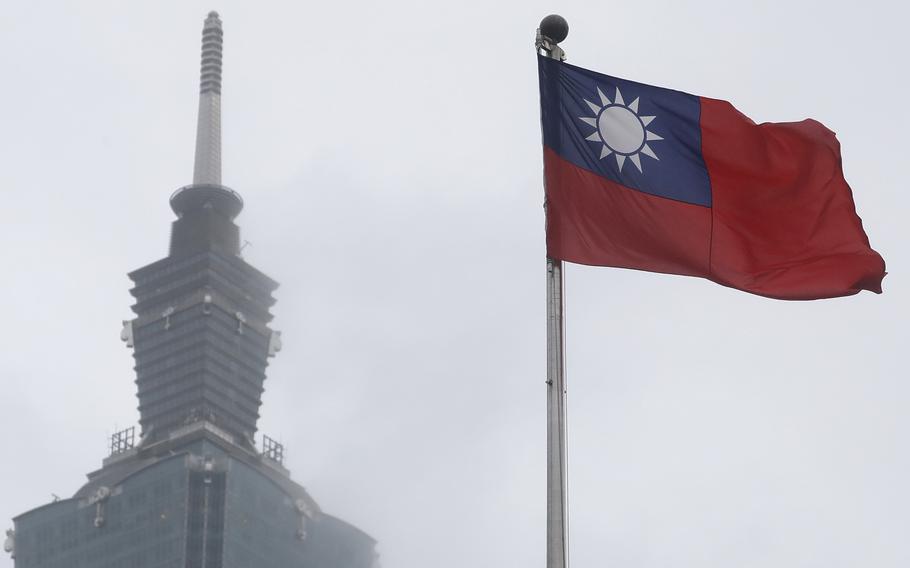
A Taiwan national flag flutters near the Taipei 101 building at the National Dr. Sun Yat-Sen Memorial Hall in Taipei, Taiwan, May 7, 2023. (Chiang Ying-ying/AP)
Seppuku, also called hara-kiri, is an incredibly painful way to die. A ritualistic Japanese way to kill oneself in feudal times involved cutting open one’s abdomen for the purpose of disembowelment. There also is a metaphorically painful way important decisions can die, one that involves sacrificing national interests due to slow decision-making. It is called nemawashi, or the act in Japan of gathering consent by all the concerned parties before a decision is made.
As in the United States, the topic of China invading Taiwan is now openly discussed in Japan. Should the United States seek to defend Taiwan, its operational success will be a function of its ability to rapidly deploy its forces to the fight, particularly those stationed in Japan. This ability, however, is not automatic. It rests on political decisions made by Tokyo. This is where a potentially huge problem lies.
Depending on the situation, the chances for delay are high as any prime minister will seek broad consent before involving Japan in its first war since the 1940s. If nemawashi drags on, Japan’s political processes will not keep pace with U.S. operational timelines, potentially resulting in China’s victory.
Consider first the need for the prime minister to declare what type of situation the unfolding crisis is, based on security legislation passed in 2015. These laws pertain to situations and what Japan’s Self-Defense Forces can do in those situations, which also carry implications on what U.S. military operations can be conducted from Japan.
The core issue at stake pertains to two situations beyond an anticipated or actual armed attack situation. The first is one that would have an important influence on Japan’s peace and security. The second is one threatening Japan’s survival. How a government defines a situation affects what its forces can do. Importantly, it provides expectations on what missions Tokyo feels comfortable with the U.S. military performing from its territory.
This decision will not be taken lightly. Despite being the responsibility of the prime minister, the government will need to ensure alignment with not just the career civil servants, but the ruling parties and the Self-Defense Forces.
A second issue that will likely emerge is the issue of prior consultation. In a January 1960 Exchange of Notes between the allies regarding the implementation of the security treaty, they agreed to engage in “prior consultation” should the United States choose to employ its forces directly from its bases for combat operations not related to Japan’s defense. If the United States chooses to defend Taiwan, but Japan itself is not attacked, the United States will need to consult with Japan prior to any desired combat operations directly from Japan.
While experts have questioned what specific processes the allies will need to follow to fulfill prior consultation, an underexamined question is who the prime minister needs to consult internally to ensure domestic buy-in. In addition to civil servants and the ruling parties, local politicians where bases are hosted will likely have a voice in this process as well.
In both sets of discussions, the Japanese government will directly confront issues of war and peace for the first time since World War II. Because the stakes are high, the prime minister will undoubtedly rely heavily on nemawashi with a large number of stakeholders. After all, a decision to support the United States could result in Chinese attacks on Japanese cities.
A non-decision could result in the disintegration of the U.S.-Japan alliance or China’s victory, thus its expansion in Japan’s backyard. Neither are attractive actions, which will lead any prime minister to conduct nemawashi to ensure domestic buy-in and spread responsibility equally.
This is not meant to be criticism of Japan. Nor is it saying that anyone in the United States would oppose the need for Tokyo to discuss an unfolding situation to ensure its officials are in agreement. The intention is to highlight the fact that what happens in Japan will directly impact U.S. operations.
The tendency for nemawashi — particularly for problems of critical importance where officials may want to dilute responsibility for making decisions with possible negative consequences — could adversely affect the ability of the United States to muster a response in a timely manner. Nemawashi is not a rapid process; it takes time as decisions are mulled over and over again to forge a consensus. There are real risks these internal discussions become mired in an endless loop of meetings that delay the necessary political approval needed to move forward rapidly.
There is a risk this nemawashi will lag significantly behind military operational imperatives, thereby inadvertently helping China and serving neither U.S. nor Japanese interests. Because American officialdom is likely to expect Japan’s immediate support of any U.S.-led military operation in the region, it behooves Washington to integrate prolonged decision-making processes into operational responses to align its processes with Japan. This requires combined planning between our armed forces and coordination among our civilian policymakers to ensure alignment.
Another option would be to negotiate with Tokyo in peacetime about the types of contingencies that are envisioned and the type of support that will be provided and when. Toward achieving that, more robust discussions are needed among officials responsible for accessing U.S. bases in Japan, coordinating operational plans between our armed forces, and interpreting standing defense-related agreements. Holding tabletop exercises that include armed forces personnel, civilian officials and politicians would also be beneficial. Without some action on Washington’s part, U.S. expectations could go unfulfilled should war break out.
The U.S. can neither ignore nor change nemawashi, but it can mitigate its negative effects on operational timelines through preparation and adroit diplomacy.
Jeffrey W. Hornung is a senior political scientist and the Japan Lead of the National Security Research Division at Rand Corp. He is also an adjunct professor at Georgetown University.